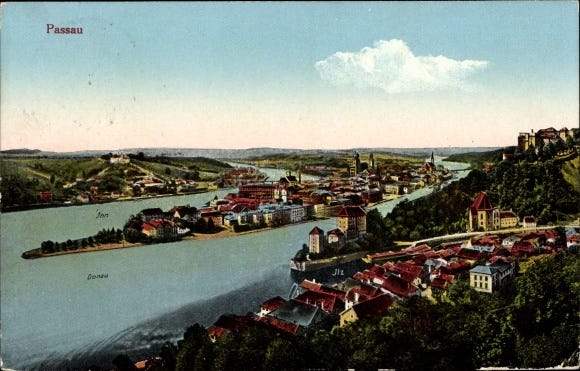May 29 - May 30, 1942.
Sophie Scholl: Still at Dr. Muth’s house. Tea with Muth and Sigismund von Radecki. Tiring conversation with Josef Furtmeier. Sophie’s frustration at inactivity, at failure to do something.
Hans Scholl and Sophie Scholl: Trip to Passau and Bohemian Forest to visit Father Schwarz and procure food for Dr. Muth.
Sophie’s “unrequited love” and crush on Alexander Schmorell. Gift given to Lilo Berndl.
White Rose History, Volume II, pages 27-29.
Notes and references
Sophie Scholl (Muth’s house, etc.):
In the earliest drafts of this book in 1994, I had portrayed Sophie Scholl – when she was among friends – as a vivacious, lively young woman who talked nonstop. During a March 1995 interview, Franz Josef Müller, director of Munich’s Weiβe-Rose-Stiftung, said that my concept of her was all wrong, that she was a quiet little mouse who always sat in a corner and never said anything.
Six weeks later, I asked Fritz and Elisabeth Hartnagel about this characteristic of Sophie. RHS: Was Sophie livelier when she was in a small group? Fritz Hartnagel and Elisabeth Scholl Hartnagel: What do you mean, “livelier”? RHS: Well, several people have said or have written that Sophie was very reserved, very quiet. But when I read her letters, I don't see her that way at all. ESH: Who said that? RHS: Among others, Franz Josef Müller. ESH: He did not know her at all. She was only reserved when she was around strangers, or whenever she deemed someone to be superficial.
FH: Yes, I agree – and one example was when she was doing her Reich Labor Service in Krauchenwies. Those girls only talked about boys and such things. Sophie did not have anything in common with them. But she always had a good time and was very lively, although she was also quite contemplative. She was strong intellectually and spiritually, and very artistic. As one example of her liveliness, she liked to climb way up in saplings and swing back and forth.
Fritz and Elisabeth Hartnagel, Stuttgart. April 1995. Two-hour interview at their residence.
Jens, Inge (Ed.). At the Heart of the White Rose: Letters and Diaries of Hans and Sophie Scholl. Translation by J. Maxwell Brownjohn. New York: Harper & Row Publishers, Inc., 1987.
Lafrenz, Traute. “Bericht.” Letter to Inge Scholl, dated February 21, 1946. Unpublished.
Ziegler, Armin. Eugen Grimminger: Widerständler und Genossenschaftspionier. Crailsheim: Baier BPB Verlag, 2000.
Hans and Sophie Scholl: Trip to Passau and Bohemian Forest:
Jens, Inge (Ed.). At the Heart of the White Rose: Letters and Diaries of Hans and Sophie Scholl. Translation by J. Maxwell Brownjohn. New York: Harper & Row Publishers, Inc., 1987.
Sophie’s unrequited love:
Fürst-Ramdohr, Lilo. Freundschaften in der Weiβen Rose. Munich: Verlag Geschichtswerkstatt Neuhausen, 1995. Lilo showed us the book.
Podcast © 2024 Denise Elaine Heap. White Rose History, Volume II, Chapter 03, © 2002 Denise Elaine Heap and Exclamation! Publishers. Please contact us for permission to quote.
This podcast is a project of WHY THIS MATTERS, a newsletter of Center for White Rose Studies, that explores the reasons that voices silenced more than eighty years ago still speak to us today.
To order digital version of White Rose History, Volume II, click here. Digital version of White Rose History, Volume I is available here.












